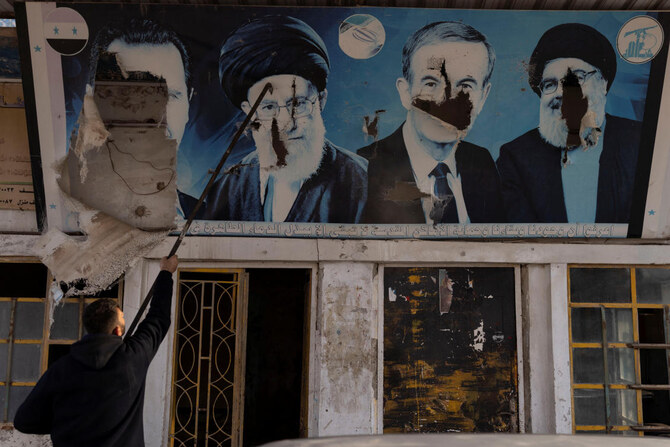BEIRUT/NUBL: Tens of thousands of Syrians, mostly Shiite Muslims, have fled to Lebanon since Sunni Muslim Islamists toppled Bashar Assad, fearing persecution despite assurances from the new rulers in Damascus that they will be safe, a Lebanese official said.
At the border with Lebanon, where thousands of people were trying to leave Syria on Thursday, a dozen Shiite Muslims interviewed by Reuters described threats made against them, sometimes in person but mostly on social media.
Their accounts reflect fears of persecution despite promises of protection by Hayat Tahrir Al-Sham (HTS) — the Sunni Islamist group which has emerged as the dominant force in the new Syria but is far from being the only armed faction on the ground.
Shiite communities have often been on the frontline of Syria’s 13-year civil war, which took on sectarian dimensions as Assad, from the minority Alawite faith, mobilized regional Shiite allies, including Lebanon’s Hezbollah, to help fight Sunni militants.
The senior Lebanese security official said more than 100,000 people, largely members of minority faiths, had crossed into Lebanon since Sunday, but could not give an exact number because most of them had used illegal crossings along the porous border.
At the main border crossing between Syria and Lebanon, Samira Baba said she had been waiting for three days to enter Lebanon with her children.
“We don’t know who sent these threats, on WhatsApp and Facebook,” she said. “The militants in charge haven’t openly threatened us, so it could be other factions, or individuals. We just don’t know. But we know it’s time to leave,” she said.
The new Syria holds uncertainty for many, especially minorities. Shiites are thought to number around a tenth of the population, which stood at 23 million before the war began.
While HTS, which has cut its ties with the global jihadist network Al-Qaeda, is the most powerful of the constellation of factions that fought Assad, there are numerous other armed groups, many of which are Islamist.
Ayham Hamada, a 39-year-old Shiite who was serving in the army when Assad fell, said the government’s collapse was so sudden that it left him and his brother, also a soldier, scrambling to decide whether to stay or go.
They fled to Damascus where they received threats, he said, without elaborating. “We are afraid of sectarian killings... this will be liquidation.”
Despite assurances voiced by HTS leader Ahmed Al-Sharaa, Hamada said minorities have been left without protection after Assad’s sudden flight. “Bashar took his money and fled and didn’t pay attention to us,” he said.
Many of the Shiites at the border were from Sayyeda Zeinab, a Damascus district home to a Shiite shrine where fighters from Hezbollah and other Shiite militias were based. Supported by Iran’s Revolutionary Guards, the Shiite militias also came from Iraq and Afghanistan, and recruited some Syrian Shiites.
Elham, a 30-year-old nurse, said she had been waiting at the crossing for days without food or water with her 10-day-old niece and two-year-old son.
A Shiite from Damascus, she said she fled to rural areas when the government fell. When she returned, she found her house looted and torched. She and others said that armed, masked men raided their homes and ordered them at gunpoint to leave, or be killed.
“They took our car because they said it’s theirs. You daren’t say a word. We left everything and fled.”
Reuters could not immediately reach HTS officials for comment on threats received by minorities.
’WE ARE ALL ONE PEOPLE’
In parts of Syria’s north, however, some residents who fled when HTS went on the offensive in late November said they now felt confident to return.
“My wife is Sunni. We are all one people and one nation,” Hussein Al-Saman, 48, a Shiite father of three told Reuters, next to the main mosque in the Shiite town of Nubl, where Hezbollah once stationed fighters.
He praised HTS leader Sharaa for his efforts to protect the community, saying he “enabled us to come to our houses.”
“We were a minority and didn’t have a choice but to stand with (Assad). But now that the war is over we are free... I hope for my children to just live comfortably under the new government.”
Bassam Abdulwahab, an official overseeing the returns, said essential services had been restored. “Security was provided to protect the minorities,” he said, adding that this “is the approach of the commanding leadership.”
“We carry the responsibility of protecting the minorities in Syria. What happens to us happens to them,” he said.
At the entrance to Nubl, a statue of Assad lay toppled. Further into the town, residents cleaned stores and repaired damaged buildings, while officials in military fatigues coordinated the return of those who had fled.
“The (Assad) government forced the minorities here to live in a situation where they had to be enemies of their neighbors,” said Muhyie Al-Dien, who works in mining. “The government played its game so it could divide us and our Sunni brothers.”
While some in Nubl spoke hopefully of the future, one 41-year-old man, who gave his name as Hami and declined to speak on camera, was more cautious. “We are Shiite and the new leadership is Sunni. We don’t know what will happen,” he said.



























